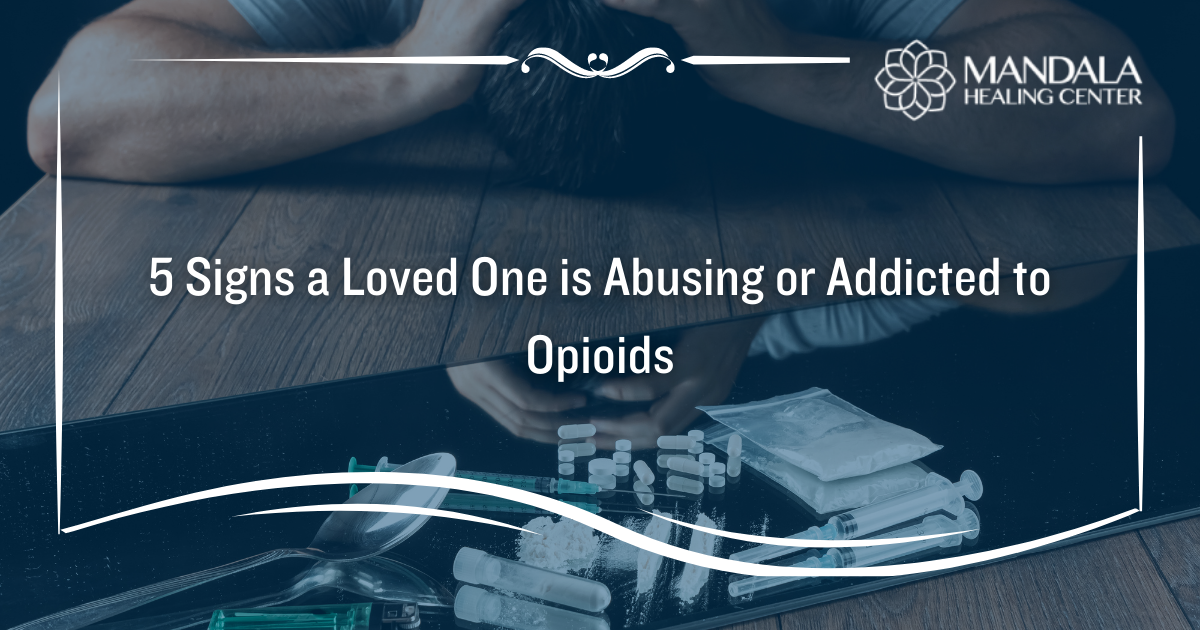An estimated 2.7 million people in the United States struggle with opioid abuse or addiction and require treatment.[1] Many begin with a prescription for opioid pain relievers and go on to form severe, devastating addictions to the drugs. Others may use opioids out of curiosity or to self-medicate pain or emotional discomfort.
Opioid medications, including Percodan, Percocet, and OxyContin, may effectively relieve moderate to severe pain for a brief period. However, opioid medications also provide a euphoric or relaxing effect that people find desirable. These effects can lead people to take more of the drug than prescribed. Without intervention and treatment, people who abuse opioids may develop a life-threatening addiction to them.
If you suspect your loved one is abusing opioids, you must learn the signs of opioid abuse and addiction so that you can offer them the support and treatment they need to recover. For more information about starting addiction treatment, reach out to the Mandala Healing Center specialists today.
The Side Effects of Opioid Abuse
You may notice some physical and emotional changes in a person who is abusing opioid drugs. Some of the drug’s side effects can be uncomfortable. These include:[2]
- Constipation
- Sweating
- Nausea
- Dry mouth
- Dizziness
- Itching
- Falling asleep
- Confusion
- Hallucinations
Using opioids can also lead to respiratory depression, which means slow, shallow breathing. The likelihood of dangerous or life-threatening overdose increases if people take more of the medication than prescribed. People who use opioids recreationally without a prescription may unintentionally take too high a dose or mix opioids with other substances. These can be dangerous, sometimes life-threatening medical events.
If you recognize the signs of opioid abuse in your loved one, you must act quickly to get them the help they need to help them avoid severe consequences to their health and wellbeing.
5 Signs of Opioid Abuse and Addiction
Anyone who abuses opioids can develop an addiction to the medications, regardless of other risk factors. It is essential to recognize the signs of addiction and know what treatment options are available so you can help your loved one seek the treatment they require.
Some common signs of opioid addiction include:
1. Their Priorities Change
When someone lives with opioid addiction, opioids become the center of their universe. All other activities and relationships come second to getting and using opioids. Someone who was once productive and social may become isolated and lose interest in work or hobbies.
You may notice your loved one has new relationships with people you don’t know. Often, people living with substance abuse or addiction will turn away from friends or family who are not using drugs and spend their time with people who are.
This shift in priorities can happen quickly and be drastic, or it may happen more slowly. But a noticeable shift in priorities could be a sign of opioid addiction.
2. Financial Problems
Addiction is expensive and severely impairs a person’s judgment. Some people with opioid addiction spend hundreds of dollars a day to meet the addiction’s demands. They may lose weight because they use their money to feed the addiction instead of themselves. Some people lose their job, can’t pay rent, and quickly drain any college or retirement savings they have.
Sudden, unexplained financial trouble or reckless decisions about money may be signs of opioid abuse or addiction.
3. Their Mood and Behavior Changes
People with an opioid addiction may develop a new personality–and it’s one that likely isn’t pleasant to be around. They may experience extreme, frequent mood swings. Irritability, aggression, or bouts of intense anxiety may become common for your loved one. A person may also begin lying or stealing to support their addiction or engage in risky or illegal activities.
People can experience changes in mood while they’re using opioids and during withdrawal from the drugs. Drastic changes in mood, behavior, or appearance may be a sign of opioid abuse or addiction.
4. They are Drowsy or Fall Asleep at Inappropriate Times
Opioids work to suppress the activity of the central nervous system (CNS). When people are living with opioid abuse, they may appear drowsy or even fall asleep while doing other activities. People may nod off at work or during routine tasks, including driving.
It is unsafe for people with opiate addiction to drive or care for children.
5. They Doctor Shop
Doctor shopping means seeking multiple prescriptions from different doctors. People who abuse opioids or have opioid addiction may visit several doctors and have more than one prescription for opioid medications. If you find evidence that your loved one has been doctor shopping, it is a clear sign of an opioid addiction that requires treatment.
If you recognize these signs of opioid addiction in someone in your life, you must act quickly to offer the support and treatment they require to overcome addiction.
Get Help for Opioid Abuse and Addiction Today
If you believe your loved one lives with opioid abuse or opioid addiction, effective treatment is available at the Mandala Healing Center. Our opioid rehab center in West Palm Beach, Florida can help you detox safely, overcome your addiction, and stay sober. Contact our caring specialists today for more information on how to support your loved one’s recovery journey.
References:












